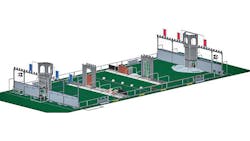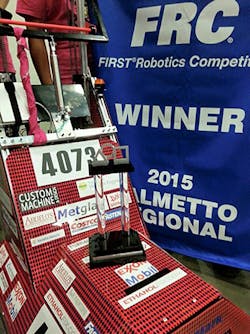The high-school robotics team had been working long nights to perfect a mechanism to launch a Frisbee through a target with frustrating results. Late one night they thought they finally had it and excitedly moved the robot to the school hallway to try a long-distance shot. The first shot floated down the long hallway and finally stopped about a hundred yards away as their cheers filled the hall! A team member ran to retrieve the Frisbee as the others made adjustments to improve the trajectory. No one had noticed the fire-safety exit sign right in the middle of the ceiling about 50 feet down the hallway. Just as their teammate passed that sign, they let loose the second shot. The sign instantly exploded into a million pieces with a loud crack, leaving nothing but dust floating in the air! The destruction was so immediate and so thorough that the team just stood there transfixed in silent awe for a moment, and then erupted in the uncontrollable whoops and laughter of hard-won success. They knew they had it!
The next morning the team coach reported the damage to the school principal. Rather than being upset she was excited, and rushed to check the security video. It was all there, the setup, the amazing shot, the vanishing EXIT sign, the cloud of dust, the stunned silence, and the cheers. She proudly shared that video with the whole school to show what the FIRST Robotic Competition had taught team 4073, the RoboKatz#.
Background
FIRST (For Inspiration and Recognition of Science and Technology) was founded in 1992 by Dean Kamen, inventor of the Segway, with the specific goal of attracting more students to technical fields of study. Borrowing from the structure and excitement of competitive sports, he set up a competition in which teams of students build and operate robots under strict constraints. FIRST has since grown to include four programs encompassing all ages of students through high school. Over 400,000 students participated last year.
FIRST Robotics Competition is the annual program in which high-school students build robots to compete in tournament-style events. In early January, FIRST hosts the “game reveal,” in which they announce the theme and rules for that year’s competition via worldwide live stream broadcast. The game is different every year. Teams have six weeks to develop a strategy, design, build, test, and refine their robot, and practice their competition skills. The competitions begin in late February around the world, culminating in the World Championship in April.
What They Learn
Teams receive a starter kit adequate to build a basic robot that can move around under remote control, but not complete enough for it to be a strong competitor. Thus, the first of many lessons: if you want to succeed, it’s up to you to make it happen. Teams must obtain whatever they need by whatever means are available to them. Rookie teams can receive a little extra help in the form of grants.
Team members learn the basic principles of design, engineering, project management, teamwork, and project planning. In addition, the constraints placed on the teams (time, budget, robot weight, size, functions, etc.) teach them valuable lessons for life. They never have enough time, enough money, enough ideas, enough people, enough parts, material or resources, but they still have a deadline—sound familiar?
Core Values
Any good competitive program creates in its participants a culture of values, team spirit, enthusiasm, and a commitment to excellence. FIRST students also learn two basic core values: gracious professionalism and "coopertition."
With gracious professionalism, fierce competition and mutual gain are not separate notions. Gracious professionals learn and compete like crazy, but treat one another with respect and kindness in the process.
Coopertition is displaying unqualified kindness and respect in the face of fierce competition. Coopertition is founded on the concept and philosophy that teams can and should help cooperate with each other even as they compete. For example, announcements like “Team 4073 needs a pressure regulator” are very common in the pit area. Soon that team is overwhelmed with offers from competing teams. I have seen experienced teams volunteer to completely rebuild major systems of a lesser experienced team’s robot during competition. Teams are here to compete, but they are also here to help.

